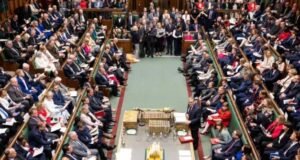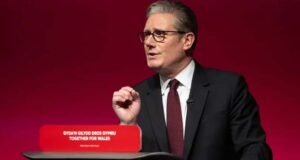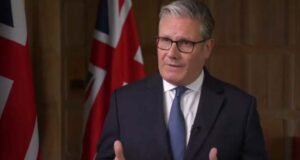
The recruitment of 20,000 new police officers in England and Wales will begin within weeks, Prime Minister Boris Johnson has said.
The College of Policing welcomed the pledge but warned of “logistical challenges”, partly because of concerns of a lack of instructors for training.
It is “not just getting people through the doors”, its chief executive said.
Forces in England and Wales lost more than 20,000 officers between September 2009 and September 2017.
Mr Johnson said he wanted the recruitment – which will be overseen by a new national policing board – to be completed over the next three years.
What’s happened to police numbers?
What will 20,000 more officers cost?
Mr Johnson said: “People want to see more officers in their neighbourhoods, protecting the public and cutting crime.”
Downing Street said a recruitment campaign would begin in September, with forces held to account for meeting the target by a new board, bringing together police leaders and led by Home Secretary Priti Patel.
Newly appointed Policing Minister Kit Malthouse said the plans would cost around £500m in the first year, but said “we still have to work out the exact number”.
He said: “In the end that money is going to come from general taxation or indeed some of the headroom we’ve got fiscally on the borrowing.
“You deal with what the priority is and you make the rest fit,” said Mr Malthouse.
But some forces are concerned they don’t have enough training instructors and police stations to support a rapid expansion.
Chief executive of the College of Policing, Mike Cunningham told BBC Radio 4’s Today programme: “There are a wide variety of logistical challenges that come with the recruitment process.”
He said the plans could be a “huge opportunity” but said the new prime minister should consider “the assessment process, the attraction, recruitment campaigns, the vetting.”
“And then of course training people, making sure they are fit for the responsibilities that they have”.
Mr Malthouse told the Today programme he understood it was a “really big target to hit” and they were aware of the issues which may arise.
He said: “A surprising logistical issue that constrains the number of police officers is access to lockers.
“Modern police officers carry a lot of equipment and that all has to be stored somewhere overnight, as they travel to and from their home – so finding locker space is going to be the key.”
The police recruitment plans will have wide appeal both for the public and the overstretched police service.
But selecting, vetting, training and accommodating so many officers in a comparatively short period of time is a formidable challenge.
New rules requiring candidates to have a degree or study for one on the job may restrict the number of potential applicants in some areas, while in others the competition for skilled workers is so fierce there are fears the target may not be reached.
What’s significant is that the recruitment campaign will be led by the Home Office and overseen by a new policing board.
It suggests a return to a more centralised approach after years when ministers pursued a localism agenda, redirecting decision-making towards police and crime commissioners.
Police recruitment on the scale and in the period now promised by Boris Johnson has never been done before in modern times.
In the last 40 years there have been three major recruitment surges:
Between 1978 and 1983 officer numbers went up by around 12,700 from 106,700 to 119,400.
Between 1985 and 1991 they increased from 118,600 to 125,400, a rise of about 6,800.
Between 2000 and 2005 officer numbers went up from 124,100 to 141,200, a rise of 17,100 – over five years.
The National Police Chiefs’ Council said a “substantial” growth in officer numbers would help cut crime, improve outcomes for victims and increase diversity in the workforce.
Ms Patel said the rise in serious violence was “deeply worrying” and recruiting additional officers “sends a clear message that we are committed to giving police the resources they need”.
“This is the start of a new relationship between the government and the police working even more closely together to protect the public,” she added.
But shadow policing minister, Louise Haigh MP, said the role of the modern officer has changed due to austerity and “simply adding more officers” to the beat will not change this.
She added that the government must make sure they are not just replacing the officers which were cut.
“It is galling to see the very same politicians that have voted for every single cut over the past few years now admitting that they were wrong and reinvesting in the police,” she said.
will play a key role in the recruitment drive
Mr Johnson first made the pledge during his leadership campaign and included it in his first speech as prime minister outside Downing Street.
The government said it would also review a pilot which makes it easier for officers to use stop and search powers, with a view to rolling it out across all forces.
Don't Miss
- Tk 26 lakh crore looted in name of development: Jamaat Ameer
- No election bid for ICT convicts: Attorney General
- One killed, 11 injured in Sylhet road mishap
- Bangladesh rout Turkmenistan 7-0 to seal spot in AFC Women’s Asian Cup
- Government funding supports borough-wide resurfacing to extend road life and cut carbon emissions
 Weekly Bangla Mirror | Bangla Mirror, Bangladeshi news in UK, bangla mirror news
Weekly Bangla Mirror | Bangla Mirror, Bangladeshi news in UK, bangla mirror news







